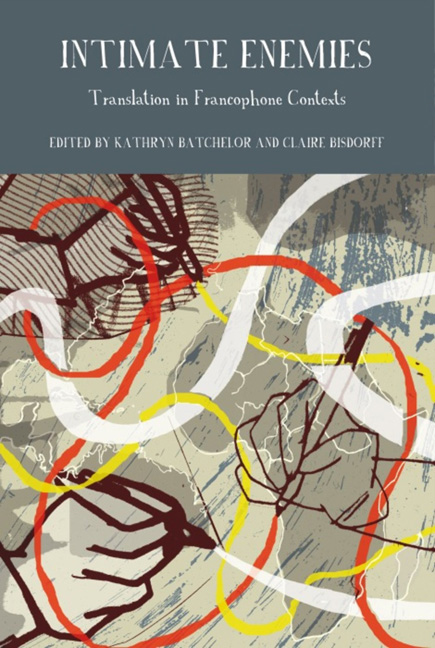Book contents
- Frontmatter
- Contents
- Illustration
- Acknowledgements
- Introduction: Translation – Formidable Enemy or Needed Friend?
- The Translation Market: Publishing and Distribution
- Writing and Translating in Practice
- Intimate Enemies: A Conversation between an Author and her Translator
- Translation: Spreading the Wings of Literature
- Translation – A Listening Art
- Ananda Devi as Writer and Translator: In interview with Julia Waters
- The Négraille's Testament: Translating Black-Label
- Translating Heterophony in Olive Senior's Stories
- Translation Challenges and New Avenues in Postcolonial Translation Theory
- Notes on Contributors
- Index
Translation: Spreading the Wings of Literature
from Writing and Translating in Practice
- Frontmatter
- Contents
- Illustration
- Acknowledgements
- Introduction: Translation – Formidable Enemy or Needed Friend?
- The Translation Market: Publishing and Distribution
- Writing and Translating in Practice
- Intimate Enemies: A Conversation between an Author and her Translator
- Translation: Spreading the Wings of Literature
- Translation – A Listening Art
- Ananda Devi as Writer and Translator: In interview with Julia Waters
- The Négraille's Testament: Translating Black-Label
- Translating Heterophony in Olive Senior's Stories
- Translation Challenges and New Avenues in Postcolonial Translation Theory
- Notes on Contributors
- Index
Summary
A prolific author of a range of genres, including poetry, novels, short stories and children's literature, and bilingual in French and English, Véronique Tadjo is particularly well-placed to reflect on the dynamics affecting writing and translating in an African context. Over the years, her work has been translated into a range of African and European languages, often in bilingual editions. Recent translations into English include Queen Pokou(2009), The Blind Kingdom (2008) and Red Earth – Latérite (2006). The English translation of Tadjo's A vol d'oiseau [As the Crow Flies] was one of the first five titles to be published as part of Penguin's new African Writers Series. Tadjo herself has translated many of her own books for children into English, and has written others in English and translated them into French. Her insights into the translation process are both creative and practical, and always strongly linked to the social and political contexts in which she works.
Politics, Writing and Translation
Kathryn Batchelor: You have said in the past that Côte d'Ivoire is ‘the main source of [your] writing, [your] painting […] and [your] creative being’ (Tadjo, 2003: 147). What is your view on recent events there, and what roles, if any, can writing and translating play in promoting peace and co-operation?
Véronique Tadjo: Yes, Côte d'Ivoire remains the main source of my inspiration. This is the place where I have invested most of my energy and commitment. I know it relatively well and I feel strongly connected, although this connection is at times very painful. The last decades have seen a steady degradation in the country's economy coupled with a deep political and military crisis. When I look back, I really started writing when I went to live in the north of Côte d'Ivoire for two years after doing my MA in African American studies at the Sorbonne in Paris. I had been very homesick in France and decided to try something new. I applied for a teaching job in a secondary school in the North of Côte d'Ivoire. There, I discovered a very different aspect of my country. I was struck by the sobriety and starkness of the savannah landscape as well as the richness of the Senufo culture with its complex traditional beliefs and its secret religion, the Poro. I think that more than anything else this new setting unlocked my creativity.
- Type
- Chapter
- Information
- Intimate EnemiesTranslation in Francophone Contexts, pp. 98 - 108Publisher: Liverpool University PressPrint publication year: 2013

